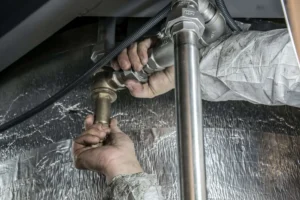Water heaters are a crucial part of your home’s plumbing system, providing hot water for various daily needs. In Florida, where the climate and water conditions can affect the lifespan of your water heater, it’s important to know when to replace it to ensure consistent performance and avoid potential issues. Here’s a guide to help you determine how often you should consider replacing your water heater.
Typical Lifespan of a Water Heater
Standard Storage Water Heaters
- Average Lifespan: 8 to 12 years
- Factors Affecting Lifespan: The lifespan of a standard storage water heater can vary based on factors like water quality, frequency of use, and maintenance practices.
Tankless Water Heaters
- Average Lifespan: 15 to 20 years
- Factors Affecting Lifespan: Tankless water heaters generally last longer than traditional models due to their design and the absence of a storage tank.
Signs Your Water Heater Needs Replacement
Age of the Unit
- Indicator: If your water heater is approaching or has exceeded its average lifespan, it may be time to consider replacement.
- Why It Matters: Older units are more likely to experience failures and inefficiencies, making replacement a more cost-effective solution.
Frequent Repairs
- Indicator: If you find yourself calling for repairs frequently, especially for issues like leaks or inconsistent water temperature, replacement might be more economical.
- Why It Matters: Continuous repairs can add up and may not address underlying issues that a new unit could resolve.
Rusty or Discolored Water
- Indicator: Rust or discoloration in your hot water can indicate internal corrosion, suggesting that the tank is deteriorating.
- Why It Matters: Corrosion can lead to leaks and further damage, making replacement necessary to avoid water damage and ensure safe, clean hot water.
Strange Noises
- Indicator: Sounds such as banging or popping can signal sediment buildup or other issues within the tank.
- Why It Matters: Persistent noises often indicate internal problems that could worsen over time, suggesting that a replacement may be needed.
Inconsistent Water Temperature
- Indicator: Difficulty maintaining a consistent water temperature or inadequate hot water supply can indicate inefficiency or malfunction.
- Why It Matters: An unreliable water heater can impact daily activities and may be a sign that the unit is no longer functioning effectively.
Choosing the Right Time for Replacement
Evaluate Energy Efficiency
- Indicator: Newer models are more energy-efficient and can lower your utility bills. If your current unit is outdated and inefficient, replacement could lead to long-term savings.
- Why It Matters: Upgrading to a more efficient model can provide both cost savings and improved performance.
Consider Climate Factors
- Indicator: In Florida’s humid climate, factors like mineral deposits and corrosion can affect your water heater’s lifespan.
- Why It Matters: Regular maintenance and timely replacement can help mitigate the impact of Florida’s climate on your water heater’s performance.
Plan for Replacement During Off-Peak Seasons
- Indicator: Replacing your water heater during less busy times for plumbers can ensure better availability and potentially lower costs.
- Why It Matters: Scheduling replacement during off-peak seasons can provide more flexibility and potentially reduce service costs.
Conclusion
Knowing when to replace your water heater is essential for maintaining an efficient and reliable hot water supply in your Florida home. By paying attention to signs such as age, frequent repairs, and changes in water quality or temperature, you can determine the right time for replacement. Investing in a new, energy-efficient model can lead to cost savings and improved performance, ensuring you have a dependable hot water source for years to come. Regular maintenance and timely upgrades are key to keeping your water heater in optimal condition.




